Tragödie/Tragedy (Carl Froelich, 1925) is a lost film. Because of her past (the letter!), Henny Porten loses her wealthy life as a countess and her dearly beloved daughter. I think the last postcard of the two Ross Verlag series is the most beautiful one: it shows the elegant but desperate Henny in tears. Tragödie is indeed a tragedy and confirms why Henny Porten was one of the most popular German screen stars of the 1910s and 1920s.
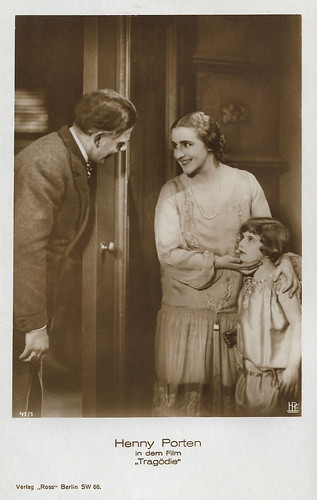
German postcard by Ross Verlag, no. 41/1. Photo: Henny-Porten-Film. Publicity still of Henny Porten as Countess Maria Tamar, Walter Janssen as Count Tamar and Annemarie Winkler as their daughter Monica in Tragödie (Carl Froelich, 1925).
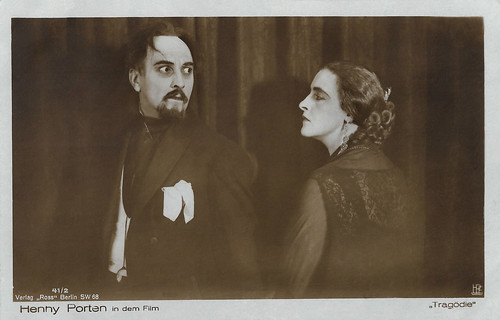
German postcard by Ross Verlag, no. 41/2. Photo: Henny-Porten-Film. Henny Porten in Tragödie (Carl Froelich, 1925).

German postcard by Ross Verlag, no. 41/3. Photo: Henny-Porten-Film. Henny Porten in Tragödie (Carl Froelich, 1925). Left, Robert Garrison, who plays a publisher, Pickart.
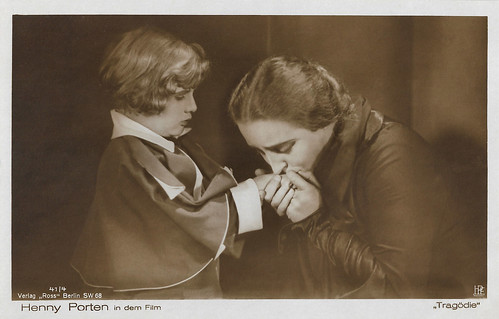
German postcard by Ross Verlag, no. 41/4. Photo: Henny-Porten-Film. Henny Porten and Annemarie Winkler in Tragödie (Carl Froelich, 1925).
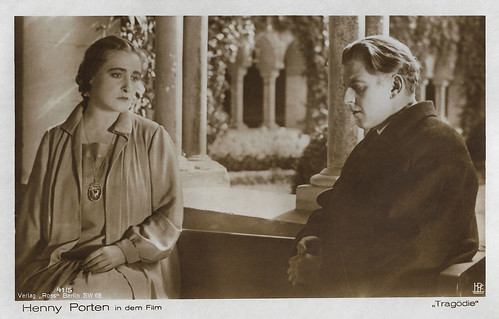
German postcard by Ross Verlag, no. 41/5. Photo: Henny-Porten-Film. Henny Porten and Walter Janssen in Tragödie (Carl Froelich, 1925).
Tragödie/Tragedy (Carl Froelich, 1925) was produced by Henny Porten's own film production company Henny-Porten-Film. Porten had founded the company in 1919 during a period when several stars started their own film studio. Most of them were finished after one or two films but Henny-Porten-Film flourished. In 1923-1924 she was seen as 'box office poison, and could only find work with difficulty.
Henny Porten achieved a renewed comeback with the melodrama Mutter und Kind/Mother and Child (1924), produced and directed by Carl Froelich. On 26 September 1924, the company Henny Porten-Froelich Produktion GmbH was founded in Berlin, in which Porten, Froelich, and Porten's husband Wilhelm von Kaufmann were associates. Till 1929, the company made fifteen star vehicles for Porten, all directed at the general public. Tragödie/Tragedy (Carl Froelich, 1925) was one of them. Tragödie was scripted by Walter Wassermann and Fred Sauer, while cinematography was by Axel Graatkjaer and sets by Franz Schroedter. The film had its premiere at the Berlin Primus-Palast cinema on 30 November 1925.
In Tragödie/Tragedy, Henny Porten plays Countess Maria, a world famous stage performer, who is blackmailed by a former lover, a frivolous stage poet (Robert Scholz). The ex-lover threatens to publish former love letters. When she visits the man to claim the letters, a wild bacchanal is going on at the house, which compromises the countess. Her husband, Count Tamar (Walter Janssen) divorces her and dumps their child (Annemarie Winkler), accorded to him, in a convent. Maria's reputation is lost, so she is refused any stage engagement. Physically and mentally broken, she collapses. Just when a friend tells her where her child is located, she dies without seeing her child again.
Hans-Michael Bock writes in his encyclopedia of the German cinema, The Concise Cinegraph: "These films were often solidly produced, but mostly comprised formulaic narratives, such as the maternal melodramas Mutter und Kind (Mother and Child, 1924) and Mutterliebe (Mother Love, 1929)." Tragödie was one of these typical melodramas with Porten, tormented by male evildoers from her shady past, who are keen on spreading slander and wrecking her well-to-do and aristocratic happy family life, while husbands are blunt and unforgiving. And often children are victims of the situation.
Porten's personal life also became a tragedy after 1933. Her refusal to divorce her Jewish husband increasingly narrowed her film options. She had only six small roles by 1943. In 1937 she was taken on by the Tobis company on a work for money basis but was never offered any work.
Carl Froelich joined the Nazi party in 1933. His company became an associate partner of the state-controlled Ufa film studio. From 1939 on, Froelich was in charge of the Gesamtverband der Filmherstellung und Filmverwertung ("Union of Film Manufacture and Film Evaluation").
In 1934, Froelich directed Ich für Dich – Du für mich on behalf of the Ministry of Propaganda. The film depicted women’s involvement in the state labour service. As a producer of entertainment films, Froelich adjusted to the 'new spirit of National Socialism'. In 1937, he was appointed professor, and in 1939, he was appointed president of the Reichsfilmkammer, a public corporation that regulated the German film industry between 1933 and 1945. After the end of the war, Froelich was arrested and 'de-Nazified' in 1948. He died in 1953.
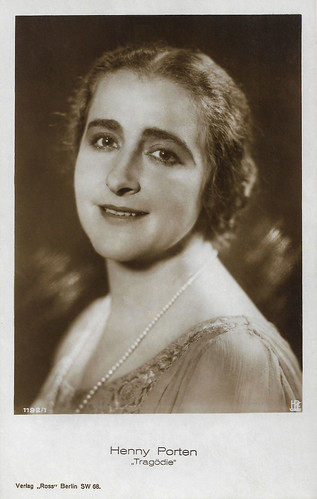
German postcard by Ross Verlag, no. 1192/1. Photo: Henny-Porten-Film. Henny Porten in Tragödie (Carl Froelich, 1925).
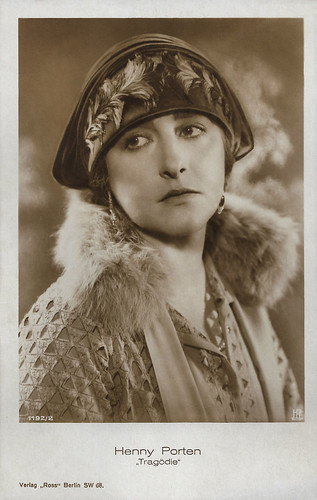
German postcard by Ross Verlag, no. 1192/2. Photo: Henny-Porten-Film. Henny Porten in Tragödie (Carl Froelich, 1925).
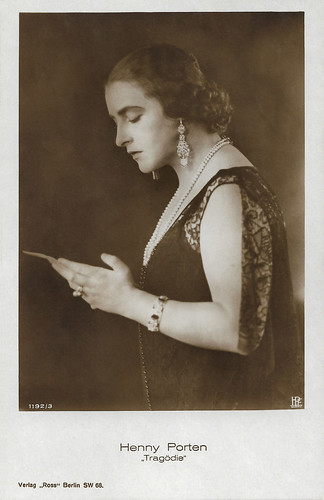
German postcard by Ross Verlag, no. 1192/3. Photo: Henny-Porten-Film. Henny Porten in Tragödie (Carl Froelich, 1925).
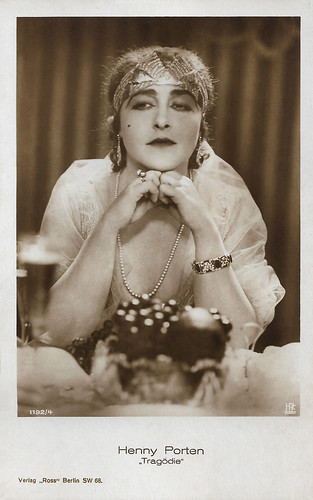
German postcard by Ross Verlag, no. 1192/4. Photo: Henny-Porten-Film. Henny Porten in Tragödie (Carl Froelich, 1925).
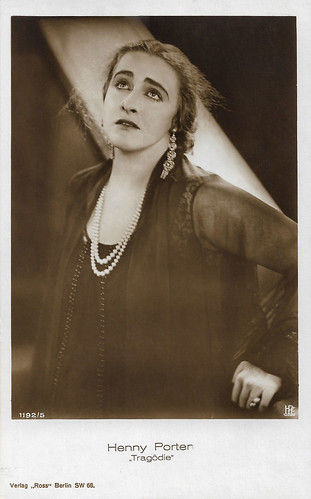
German postcard by Ross Verlag, no. 1192/5. Photo: Henny-Porten-Film. Henny Porten in Tragödie (Carl Froelich, 1925).
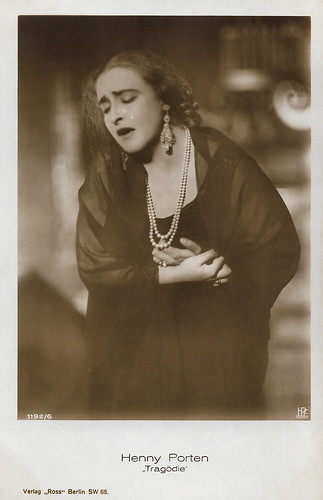
German postcard by Ross Verlag, no. 1192/6. Photo: Henny-Porten-Film. Henny Porten in Tragödie (Carl Froelich, 1925).
Sources: Hans-Michael Bock (The Concise Cinegraph), Filmportal.de, Wikipedia, and IMDb.
This post was last updated on 7 May 2021.

German postcard by Ross Verlag, no. 41/1. Photo: Henny-Porten-Film. Publicity still of Henny Porten as Countess Maria Tamar, Walter Janssen as Count Tamar and Annemarie Winkler as their daughter Monica in Tragödie (Carl Froelich, 1925).

German postcard by Ross Verlag, no. 41/2. Photo: Henny-Porten-Film. Henny Porten in Tragödie (Carl Froelich, 1925).

German postcard by Ross Verlag, no. 41/3. Photo: Henny-Porten-Film. Henny Porten in Tragödie (Carl Froelich, 1925). Left, Robert Garrison, who plays a publisher, Pickart.

German postcard by Ross Verlag, no. 41/4. Photo: Henny-Porten-Film. Henny Porten and Annemarie Winkler in Tragödie (Carl Froelich, 1925).

German postcard by Ross Verlag, no. 41/5. Photo: Henny-Porten-Film. Henny Porten and Walter Janssen in Tragödie (Carl Froelich, 1925).
The social repression by patriarchy over women
Tragödie/Tragedy (Carl Froelich, 1925) was produced by Henny Porten's own film production company Henny-Porten-Film. Porten had founded the company in 1919 during a period when several stars started their own film studio. Most of them were finished after one or two films but Henny-Porten-Film flourished. In 1923-1924 she was seen as 'box office poison, and could only find work with difficulty.
Henny Porten achieved a renewed comeback with the melodrama Mutter und Kind/Mother and Child (1924), produced and directed by Carl Froelich. On 26 September 1924, the company Henny Porten-Froelich Produktion GmbH was founded in Berlin, in which Porten, Froelich, and Porten's husband Wilhelm von Kaufmann were associates. Till 1929, the company made fifteen star vehicles for Porten, all directed at the general public. Tragödie/Tragedy (Carl Froelich, 1925) was one of them. Tragödie was scripted by Walter Wassermann and Fred Sauer, while cinematography was by Axel Graatkjaer and sets by Franz Schroedter. The film had its premiere at the Berlin Primus-Palast cinema on 30 November 1925.
In Tragödie/Tragedy, Henny Porten plays Countess Maria, a world famous stage performer, who is blackmailed by a former lover, a frivolous stage poet (Robert Scholz). The ex-lover threatens to publish former love letters. When she visits the man to claim the letters, a wild bacchanal is going on at the house, which compromises the countess. Her husband, Count Tamar (Walter Janssen) divorces her and dumps their child (Annemarie Winkler), accorded to him, in a convent. Maria's reputation is lost, so she is refused any stage engagement. Physically and mentally broken, she collapses. Just when a friend tells her where her child is located, she dies without seeing her child again.
Hans-Michael Bock writes in his encyclopedia of the German cinema, The Concise Cinegraph: "These films were often solidly produced, but mostly comprised formulaic narratives, such as the maternal melodramas Mutter und Kind (Mother and Child, 1924) and Mutterliebe (Mother Love, 1929)." Tragödie was one of these typical melodramas with Porten, tormented by male evildoers from her shady past, who are keen on spreading slander and wrecking her well-to-do and aristocratic happy family life, while husbands are blunt and unforgiving. And often children are victims of the situation.
Porten's personal life also became a tragedy after 1933. Her refusal to divorce her Jewish husband increasingly narrowed her film options. She had only six small roles by 1943. In 1937 she was taken on by the Tobis company on a work for money basis but was never offered any work.
Carl Froelich joined the Nazi party in 1933. His company became an associate partner of the state-controlled Ufa film studio. From 1939 on, Froelich was in charge of the Gesamtverband der Filmherstellung und Filmverwertung ("Union of Film Manufacture and Film Evaluation").
In 1934, Froelich directed Ich für Dich – Du für mich on behalf of the Ministry of Propaganda. The film depicted women’s involvement in the state labour service. As a producer of entertainment films, Froelich adjusted to the 'new spirit of National Socialism'. In 1937, he was appointed professor, and in 1939, he was appointed president of the Reichsfilmkammer, a public corporation that regulated the German film industry between 1933 and 1945. After the end of the war, Froelich was arrested and 'de-Nazified' in 1948. He died in 1953.

German postcard by Ross Verlag, no. 1192/1. Photo: Henny-Porten-Film. Henny Porten in Tragödie (Carl Froelich, 1925).

German postcard by Ross Verlag, no. 1192/2. Photo: Henny-Porten-Film. Henny Porten in Tragödie (Carl Froelich, 1925).

German postcard by Ross Verlag, no. 1192/3. Photo: Henny-Porten-Film. Henny Porten in Tragödie (Carl Froelich, 1925).

German postcard by Ross Verlag, no. 1192/4. Photo: Henny-Porten-Film. Henny Porten in Tragödie (Carl Froelich, 1925).

German postcard by Ross Verlag, no. 1192/5. Photo: Henny-Porten-Film. Henny Porten in Tragödie (Carl Froelich, 1925).

German postcard by Ross Verlag, no. 1192/6. Photo: Henny-Porten-Film. Henny Porten in Tragödie (Carl Froelich, 1925).
Sources: Hans-Michael Bock (The Concise Cinegraph), Filmportal.de, Wikipedia, and IMDb.
This post was last updated on 7 May 2021.
No comments:
Post a Comment